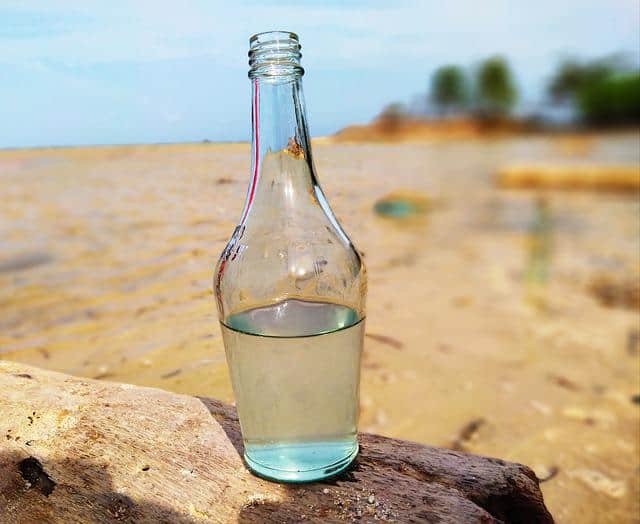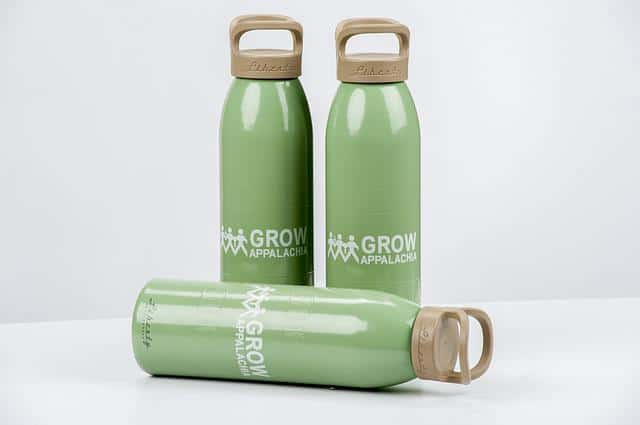[Update: 03/05/2024 we added a resource link to a United Nations report on life cycle analysis which underscored a need for peer reviewed studies]
Introduction – Plastic Bottle Alternatives
Plastic bottles are one of the most common pieces of trash littering our environment. The production carbon footprint alone of each bottle is 300-500 g CO2 per bottle. Bottles clog up landfills, pollute our oceans, and potentially endanger wildlife. Fortunately, there are many ways to recycle plastic bottles, so they don’t end up harming the planet. So, what are some plastic bottle alternatives? We will discuss it in the next section.

Plastic is an easy go-to for transporting liquids like water and soda, but besides the carbon generation it has a major downside: its tendency to end up as litter. Reuters estimates that worldwide, people use about 481 billion plastic water bottles, and according to other stats less than 30% of them are recycled. The rest end up in landfills where they can take centuries to decompose, or they become pollution in our oceans and waterways.
Plastic Bottle Problem – Only 9% Recycled
We all know why recycling is important. It conserves resources, reduces pollution, and helps to keep our planet clean. But did you know that only 9% of all plastic ever produced has been recycled? That means that 91% of plastic is in landfills or the environment. And it’s not just bottles and cans that we need to worry about. Plastic straws, coffee cups, take-out containers, and Styrofoam are all major contributors to the problem.
Plastic Bottle Alternatives Will Help Immensely
So why are plastic alternatives necessary? By making small changes in our everyday lives, we can help reduce the amount of plastic waste in landfills and the environment. Let’s do our part to make the world a cleaner place for future generations! Here are ten alternatives for plastic water bottles:
1. Glass Bottles

Glass bottles offer a safe and sustainable alternative to plastic bottles. Glass is a natural material that you can recycle without losing its quality. Glass bottles are also non-toxic. They do not leach chemicals into their contents like some plastics can.
Glass is a much more durable material than plastic, meaning that glass bottles will last longer and are less likely to end up in a landfill. In addition, glass bottles have a much lower carbon footprint than plastic bottles, as they require less energy and resources to produce. For these reasons, glass bottles offer a far superior option to plastic bottles.
2. Reusable Bottles

Reusable bottles are a great alternative to plastic water bottles. They are made of durable materials like glass or stainless steel, which can be reused repeatedly. Reusable bottles often come with a built-in filter, so you can fill them with tap water and know that you’re getting clean, filtered water.
They’re also great for keeping your drinks cold or hot, depending on what you’re in the mood for. Best of all, reusable bottles help reduce the amount of plastic waste that ends up in landfills and oceans each year.
3. Biodegradable Disposable Water Bottles

Biodegradable disposable water bottles are a great alternative to regular plastic bottles. They are made from cornstarch and other biodegradable materials, so they will break down over time, unlike regular plastic bottles, which can take hundreds of years to decompose.
When biodegradable products break down, carbon dioxide is released into the air. But as long as the raw materials come from renewable sources like corn, the carbon will be absorbed back into the plants for its next cycle. This forms a closed-loop solution.
Biodegradable disposable water bottles are also a much better choice for the environment because they produce far fewer greenhouse gasses during their production than regular plastic bottles.
4. Boxed water

Boxed water has become popular in recent years as a more sustainable alternative to bottled water. Boxed water is typically made from paperboard sourced from sustainably managed forests. The paperboard is lined with a plant-based resin, making it strong and durable enough to hold water.
Boxed water is also often certified by the Forest Stewardship Council (FSC), ensuring that it meets the highest standards for sustainability. You can use boxed water just like bottled water, but it often has a longer shelf life due to how it is packaged.
Boxed water is also easier to recycle than plastic bottles, and many companies are working to make their packaging even more sustainable in the future.
A downside of a cardboard box is that its carbon footprint is likely about the same as plastic – it takes energy to harvest timber, produce the box, and then it degrades in the landfill. Worse, when the box is lined with plastic, it becomes non-recyclable as its a mixed material rather than fully paper. For this reason we’re not completely hot on boxed water.
5. Stainless Steel Water Bottles

Stainless Steel Water Bottles have become a popular alternative to plastic water bottles. Stainless steel is a sustainable material that can be reused multiple times, making it more sustainable than plastic. Stainless steel water bottles are also free of BPA and other harmful chemicals, making them a safer option for you and the environment.
Stainless steel water bottles can keep your water cold for hours, making them ideal for long days out in the sun. They are also dishwasher safe, meaning you can easily clean them without hassle.
6. Refillable Water Bottles

Refillable water bottles are a great alternative to plastic bottles. They are made of durable materials that can be reused repeatedly. They are also available in various sizes, so you can choose the perfect one for your needs. Refillable water bottles come with a screw-on lid that helps to keep your water fresh and safe to drink. They also have a carrying strap that makes it easy to transport them with you on the go.
7. Cardboard Bottles

Cardboard bottles are a new type of container made entirely out of paper cardboard. Unlike plastic bottles, they are 100% biodegradable and recyclable. Cardboard bottles have several advantages over plastic bottles.
First, they are much lighter than plastic bottles, making them easier to transport. Second, they are made from renewable materials and have a smaller environmental impact. Third, you can use them multiple times before being recycled. Fourth, the carbon impact of cardboard is less than plastic in terms of both production and breakdown.
8. Silicone Bottles

Silicone bottles are a great alternative to plastic water bottles. They are made of 100% food-grade silicone, which is safe for your health. Silicone is a non-toxic, odorless, and tasteless material that does not leach chemicals into your water as plastic does.
Silicone is hypoallergenic and can be reused over and over again. Silicone bottles are lightweight and easy to carry with you on the go. They are also dishwasher safe and can be frozen or microwaved.
9. Ceramic Bottles

Ceramic bottles are an excellent choice over plastic water bottles. They are made of natural materials and are environmentally friendly and sustainable. Ceramic bottles also have several benefits over plastic water bottles. They are non-toxic, durable, and stylish.
Ceramic bottles can also be reused over and over again, which reduces waste and saves money. In addition, ceramic bottles are better for your health than plastic water bottles because they don’t leach chemicals into your water. Ceramic bottles are a great way to stay hydrated without harming the environment or your health.
The Need for Further Research
According to the United Nations Environment Programme’s June 2020 report, there exists a significant lack of peer-reviewed research comparing the environmental impacts of reusable metal bottles to single-use plastic alternatives.
This deficiency underscores the urgent need for rigorous scientific studies to validate the environmental benefits purportedly offered by reusable containers. Only through robust, peer-reviewed investigations can we ensure that the choices we advocate for today are indeed beneficial for our planet in the long run.
Wrapping Up – Plastic Bottle Alternatives
In conclusion, there are many sustainable alternatives to plastic water bottles. Stainless steel, paper, silicone, and ceramic bottles are all great options that are better for the environment and your health. These materials can be reused multiple times, which reduces waste and saves money. When choosing a water bottle, consider your needs and the impact that your choice will have on the environment.
